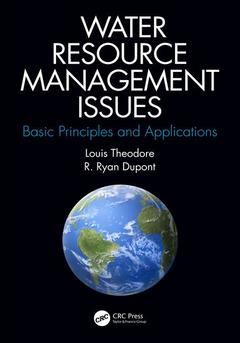Water Resource Management Issues Basic Principles and Applications
Auteurs : Theodore Louis, Dupont R. Ryan

Drinking Water Safety: Basic Principles and Applications, examines the technical and scientific, as well as regulatory, ethical, and emerging issues of pollution prevention, sustainability, and optimization for the production and management of safe drinking water to cope with environmental pollution, population growth, increasing demand, terrorist threats, and climate change pressures. It presents a summary of conventional water and wastewater treatment technologies, in addition to the latest processes.
Features include:
Provides a summary of current and future of global water resources and availability.
Summarizes key U.S. regulatory programs designed to ensure protection of water quality and safe drinking water supplies, with details on modern approaches for water utility resilience.
Examines the latest water treatment technologies and processes, including separate chapters on evaporation, crystallization, nanotechnology, membrane-based processes, and innovative desalination approaches.
Reviews the specialized literature on pollution prevention, sustainability, and the role of optimization in water treatment and related areas, as well as references for further reading.
Provides illustrative examples and case studies that complement the text throughout, as well as an appendix with sections on units and conversion constants.
SECTION I Overview Chapter 1Glossary of Terms Chapter 2Historical Perspective Chapter 3 Water Properties Chapter 4Water Chemistry Chapter 5Environmental Regulatory Framework Chapter 6The Clean Water ActChapter 7The Safe Drinking Water Act Chapter 8Water Monitoring and Analysis SECTION II Water Resources Chapter 9Water Resources of the United States Chapter 10Global Water Resources SECTION III Water Treatment Technologies Chapter 11Drinking Water Treatment Chapter 12Municipal Wastewater Treatment Chapter 13Industrial Wastewater Treatment Chapter 14Evaporation Chapter 15Membrane Separation Processes Chapter 16Crystallization Chapter 17Nanotechnology SECTION IV The Future Chapter 18New Options for Water Desalination Chapter 19Terrorism Considerations Chapter 20The Pollution Prevention Approach Chapter 21Sustainability Chapter 22The Role of Optimization Chapter 23Ethical Considerations Chapter 24Future U.S. Water Security
Raised in Hell’s Kitchen, Lou Theodore received the degrees of M.Ch.E and Eng.Sc.D from New York University and B.Ch.E. from The Cooper Union. Over the past 50 years, Dr. Theodore has been a successful educator at Manhattan College (holding the rank of Full Professor of Chemical Engineering), Graduate Program Director, researcher, professional innovator, and technical communicator. During this period, he was primarily responsible for his program achieving a No. 2 ranking by the US News & World Report, and particularly successful in placing students in internships, jobs, and graduate schools.
Dr. Theodore is an internationally recognized lecturer who has provided more than 200 courses to industry, government and technical associations. Dr. Theodore developed and served as the principal moderator/lecturer for US EPA courses on hazardous waste incineration and air pollution control equipment, consulted for several industrial companies in the field of pollution prevention and environmental management, and served as a consultant/expert witness for the US EPA and US Department of Justice.
Dr. Theodore is the author of more than 90 text/reference books ranging from Pollution Prevention to Air Pollution Control to Hazardous Waste Incineration and Engineering and Environmental Ethics.
Dr. Theodore is the recipient of the Air and Waste Management Association's (AWMA) prestigious Ripperton award that is "presented to an outstanding educator who through example, dedication and innovation has so inspired students to achieve excellence in their professional endeavors." He was also the recipient of the American Society for Engineering Education (ASEE) AT&T Foundation award for "excellence in the instruction of engineering students."
He currently serves as a part-time consultant to Theodore Tutorials. Dr. Theodore is a member of Phi Lambda Upsilon, Sigma Xi, Tau Beta Pi, American Chemical Society, American Society of Engineering Education,
Date de parution : 12-2019
17.8x25.4 cm
Thèmes de Water Resource Management Issues :
Mots-clés :
PPCP Removal; TMDL Study; Water treatment; Sea Water; Evaporation; Salt Water; Crystallization; PPCP; Nanotechnology; EPA Administrator; Membrane Separation Processes; EPA 2019a; The Clean Water Act (CWA); NPDES Permit; The Safe Drinking Water Act (SDWA); Energy Conservation; Sustainability; Aeration Tank; Water resources; Bod Test; ISO 14000; Hydraulic Retention Time; U.S; regulatory programs; Source Water Protection; safe drinking water supplies; Green Infrastructure; pollution prevention; Bod Removal; global water resources; SDWA; water treatment technologies; NPDES; Hydrogen Sulfide; Biodegradable Organic; Wastewater Treatment; RO Unit; Evaporation Route; PPOA; Pollution Prevention Program



